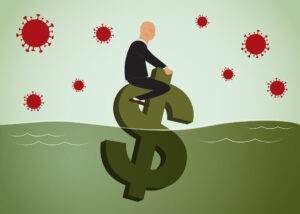The recently passed CARES Act included a number of provisions providing tax and student loan relief. And free money. On today’s column, I look at a few pieces of the new legislation that can be used to maximize tax savings and minimize student loan payments for those on IBR and PSLF payment plans.
For 2020 Only: Student Loans Can Be Paid With Pre-Tax Money
For 2020, employers can pay up to $5,250 of an employee’s student loans and it will be tax-free to the employee. Since this is only effective for one year, take advantage of this if you can. The employer must pay the student loan lender directly. It can be paid in a lump sum or can be spread out monthly.
This provision will greatly benefit employees with multiple part-time employers, each of whom can pay up to $5,250 toward their student loans tax free. It will also benefit high-income taxpayers who will not only get a bigger tax break but are also in a better position to pay the full $5,250.
Solo practitioners who have set up a corporation for their practice should have the corporation pay the student loan lender to take advantage of the tax savings. The corporation can take a business deduction for the payment while the solo-shareholder does not have to recognize the payment as W-2 income.
On the other hand, those with lower incomes are likely to be disadvantaged. Because they are in a lower tax bracket, their tax savings will not be as big. Also, most probably work for small firms and their employers may not want to make their payroll more complicated by paying someone other than the employee. And if the employee has no discretionary income after paying for food, shelter, and transportation, they cannot take advantage of this provision at all. Lastly, even if they could, if they have six-figure loans, paying $5,250 spread out over the remaining months of 2020 will barely put a dent on the principal.
I suggest that this provision be integrated with the existing student loan interest deduction and allow a combined maximum student loan (principal and interest) deduction of $7,750.
Should Married Couples File Jointly Or Separately? It’s Even More Complicated
One of the highlights of the bill is that each person will be eligible for a stimulus payment of $1,200. But this payment amount will start to decrease if their adjusted gross income (AGI) as shown on their 2019 tax return (or 2018 tax return if 2019 is not filed yet) is greater than $75,000. The payment will decrease by $5 for every additional $100 of income. If the taxpayer’s AGI exceeds $99,000, they will not be eligible for any payment.
Married couples filing jointly can qualify for the full $2,400 payment if their combined AGI is under $150,000. If their AGI is above $150,000, the payment amount will decrease. And if their AGI is above $198,000, they will not be eligible for any payment. Those filing separately will be treated with the same eligibility rules as single people.
Married couples should file jointly if their combined AGI would qualify them for the full refund as opposed to filing separately. For example, suppose one spouse has an AGI of $90,000 and the other’s AGI is $60,000. If filing separately, the spouse with $90,000 would get a stimulus payment of $450 while the spouse with $60,000 will get the full $1,200 for a total stimulus payment of $1,650. But if filing jointly, they would be eligible for the full $2,400 since their joint income is within the $150,000 limit.
But some couples don’t file jointly even if it results in lower taxes and a larger stimulus payment. This is because doing so will increase their IBR student loan payments and the increase can offset any savings they receive by filing jointly.
Federal Student Loan Payment And Interest Accrual Are Suspended
The CARES Act suspends monthly payments and interest accrual of federal student loans until September 30, 2020. For those on IBR and PSLF repayment plans, even though the payment requirements have been suspended, they will still be treated as if they made timely payments during those months. So those on PSLF should take this blessing and stop making payments immediately until the suspension period is over.
Even for those on other types of payment plans, this gives no incentive to continue making monthly payments. Instead, the money should be saved until the end of the suspension period which could be extended beyond September 30. The saved payments could be used for emergencies. Or they can be used to pay down the loan which includes additional principal.
The suspension of payment and interest accrual does not apply to private loans.
Tax Return Filing Deadline Extensions Can Result In Avoiding Higher IBR Payments for 2019
Lastly, the IRS has extended the tax return filing and payment deadlines until July 15, 2020. An extension to the filing deadline (not payment) is also allowed, which will push the extended due date to January 15, 2021. Most states have followed the IRS’s lead.
This deadline extension is useful for those on IBR or PAYE plans who face higher monthly payments because they will report a higher AGI on their 2019 returns. Since the monthly IBR payment amounts is determined in part by a borrower’s AGI, if the borrower’s 2019 AGI is higher than his or her 2018 AGI, they will be better off filing an extension to push the filing due date to January 15, 2021.
In conjunction with the federal loan payment suspension mentioned above, the borrower will continue to pay the monthly payment based on the lower 2018 income after the suspension period ends so long as the extension is filed. The payments can be lowered after the suspension period if they can prove financial hardship to the lender.
Assuming that the taxpayer will report a lower AGI for 2020, the taxpayer should file an extension and later file the 2019 return on the new January 15, 2021, deadline. The 2020 tax return should then be filed soon thereafter. If done correctly, the borrower could avoid paying the higher 2019 monthly payments or only pay them for a few months before the payments are converted to the lower payments based on the 2020 AGI.
The CARES Act provides some tax and student loan relief to mitigate the economic downturn. With the proper planning, some people who had a very good year in 2019 can save a significant amount of money if they are seeking loan forgiveness through an income-based repayment plan. If possible, it might be best to wait before filing since there is already talk of Phase Four of the CARES Act. Feel free to reach out to me if you have any questions. I’m pretty much quarantined anyway.
Steven Chung is a tax attorney in Los Angeles, California. He helps people with basic tax planning and resolve tax disputes. He is also sympathetic to people with large student loans. He can be reached via email at sachimalbe@excite.com. Or you can connect with him on Twitter (@stevenchung) and connect with him on LinkedIn.
 Kathryn Rubino is a Senior Editor at Above the Law, and host of The Jabot podcast. AtL tipsters are the best, so please connect with her. Feel free to email her with any tips, questions, or comments and follow her on Twitter (@Kathryn1).
Kathryn Rubino is a Senior Editor at Above the Law, and host of The Jabot podcast. AtL tipsters are the best, so please connect with her. Feel free to email her with any tips, questions, or comments and follow her on Twitter (@Kathryn1).


 Ellen Trachman is the Managing Attorney of
Ellen Trachman is the Managing Attorney of 





 Jordan Rothman is a partner of
Jordan Rothman is a partner of 




